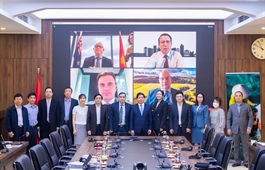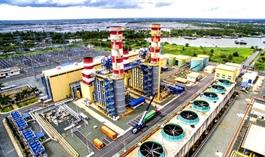Japanese investors circling around greener ventures
Japanese investors circling around greener ventures
Japanese investors are planning to pour more money into renewables and environment-based projects in Vietnam, as part of both nations’ drive to help Vietnam achieve sustainable development.
Hau Giang Bio Energy JSC, a joint venture from Erex Co., Ltd. from Japan, Power Engineering Consulting JSC2, and Son My Renewable Energy JSC, is eager to complete procedures to start the construction of a biomass power plant in the Mekong Delta province of Hau Giang.
Besides that, the company’s leaders and its partners are studying biomass resources in nearly 20 cities and provinces to look for investment opportunities for other plants.
Erex chairman and CEO Honna Hitoshi said, “The company plans to generate 1,500MW of biomass power by 2035, and simultaneously cutting 27,570 kilotonnes of CO2 per year. Vietnam is the first country that Erex considers investing in biomass power plants outside Japan.”
The company is also looking for places to grow great millet, also commonly known as sorghum, with a total area of 12,000 hectares to export to Japan. According to its survey, Phu Yen, Binh Thuan, Ba Ria-Vung Tau, and Hau Giang are provinces that have suitable natural conditions for this grass species.
The potential of Vietnam’s renewable energy market is luring more Japanese companies. In December last year, Marubeni Green Power Vietnam, a wholly-owned subsidiary of Japan-based Marubeni Corporation, signed a power purchase agreement with Ajinomoto Vietnam Co., Ltd. in which Marubeni Green Power will supply electricity generated by a rooftop solar photovoltaic system in Vietnam.
Last October, Sojitz Osaka Gas Energy Company Ltd., a joint venture company between Sojitz Corporation and Osaka Gas Co., Ltd., partnered with Looop Inc. to establish a new joint venture company called SOL Energy. It will begin operations of a rooftop solar power generation business geared towards industrial and commercial customers in Vietnam, according to a SOL Energy notice.
SOL Energy plans to install rooftop solar panels that can provide over 10MW of solar power to customers at Sojitz-operated Long Duc Industrial Park in the southern province of Dong Nai. Installation of solar panels is expected to reduce CO2 emissions for this park as a whole by approximately 5,800 tonnes annually.
Increasing investment in renewable energy and decarbonisation projects is becoming a Japanese trend. A survey organised by the Japan Bank for International Cooperation under the implementation by Mitsubishi Research Institute in September-October last year, and published this March, showed that 51 of the surveyed businesses said they have plans to invest in renewable energy projects, as well as manufacture products relating to energy safety in Vietnam.
A further 30 Japanese groups prefer to invest in projects collecting and recycling waste and industrial infrastructure projects relating to the environment.
The trend is also being backed by the Japanese government. In July 2021, it pledged to offer $10 billion in financial aid for decarbonisation projects in Asia, including Vietnam, such as renewable energy and conversion to gas-fired power generation to help with an energy transition.
The Vietnamese and Japanese governments have been boosting bilateral cooperation in the sectors of environment and renewable energy, and also in green economic development.
A Japan-Vietnam environmental policy dialogue is held annually, exchanging opinions on a wide range of areas, such as green growth strategy and low carbon society, environmental impact assessments, wastewater management, management of chemical substances, and much more.
According to a joint statement released by both nations on the occasion of Prime Minister Pham Minh Chinh’s official visit to Japan last November, Vietnam and Japan will facilitate more investments from the latter into the former in the sectors of environmental and renewable energy for sustainable development.
“The two prime ministers recognised the importance of simultaneously achieving both sustainable economic growth and reduction of greenhouse gas emissions as well as various pathways for realistic transitions depending on the circumstances of each country and constant innovation in order to achieve carbon neutrality by 2050,” the statement said. “Prime Minister Kishida announced that Japan would provide comprehensive support for energy transitions in Vietnam through the Asia Energy Transition Initiative, including the formulation of roadmaps and Prime Minister Chinh welcomed this.”



















